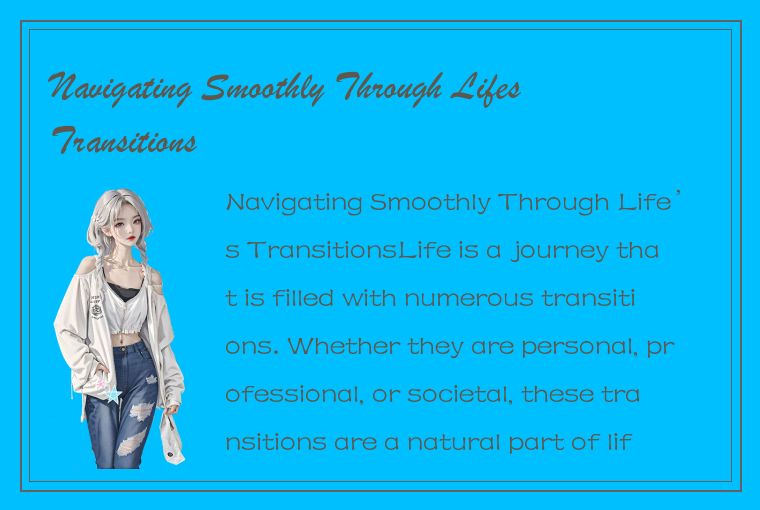Navigating Smoothly Through Life’s Transitions

Life is a journey that is filled with numerous transitions. Whether they are personal, professional, or societal, these transitions are a natural part of life. Some transitions are happy and exciting, while others can be stressful, overwhelming, or even traumatic. However, regardless of what type of transition we might be facing, it is essential to learn how to navigate these changes smoothly.
What is a Transition?
A transition is a period of change when people move from one state or situation to another. Such changes may include moving to a new city or country, starting a new job, getting married, having children, or even retiring. Transitions offer opportunities for growth, exploration, and self-discovery, but they can also be challenging.
Here are some strategies to help you navigate through life’s transitions more smoothly:
Expect Change
The only constant in life is change. Therefore, we should prepare ourselves mentally and emotionally for any transition that may come our way. When we expect changes to happen in our lives, we can better prepare ourselves for the challenges and opportunities that might arise.
Plan and Prepare
It is essential to plan and prepare as much as possible for any transition. If you know what the next stage of your life will entail, it makes it easier to create a plan of action. For example, if you are moving to a new city, research your new location, plan your move ahead of time, and have realistic expectations of what your new life will be like.
Stay Positive
Positivity is key when navigating through any transition. Focus on the opportunities and growth that this change will bring, rather than on the potential hardships. Change can be difficult, but by maintaining a positive attitude, you can find the motivation needed to carry on and succeed.
Get Support
Change can be overwhelming, and you do not have to navigate through it alone. Reach out to friends, family, or a professional therapist for support. Having a support system can help provide emotional stability, guidance, and an outside perspective.
Practice Self-Care
Transitions can be mentally and physically draining, especially if they involve a significant life change. It is important to practice self-care and prioritize your mental and physical health. This could include regular exercise, healthy eating, meditation, or other forms of self-care that make you feel happier and more balanced.
Accept Your Feelings
It is common to experience a wide range of emotions during any transition. This can include fear, anxiety, excitement, or uncertainty. Accept your feelings and understand that they are all valid. Expressing your emotions will help you work through them and allow you to move forward.
Be Patient
Transitions take time, so it is important to be patient with yourself during this process. Understand that it may take time to adjust to the changes and to find your place in the new situation. With time, patience, and hard work, you will eventually find your own unique path in life.
In conclusion, life’s transitions play a significant role in defining who we are and where we end up in life. While change can be difficult, embracing change and learning how to navigate transitions smoothly offers the potential for growth and personal development. By following these strategies, you can prepare yourself for any transition, welcome new opportunities, and move forward in life with greater confidence and ease.




 QQ客服专员
QQ客服专员 电话客服专员
电话客服专员